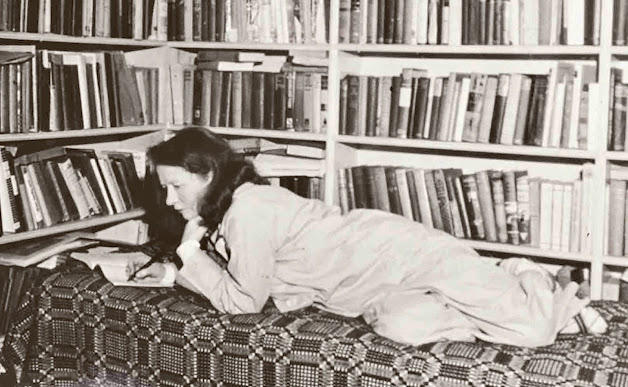That is a human skeleton under the cataract,
The jet bones shining in the white noise,
The black bones of a man of light.
It is a cascade that accepts
Human form from the bones
That have walked into it, and stand;
It must have been his method of death
To walk into a waterfall and be washed away,
Licked clean down to the jetting bones;
And the bones articulate the roar
Of the cataract that seems to speak
Out of the ribs and skull:
His white-haired sermon from the pelting brow,
The unfathomable water-lidded sockets;
Clad in robes that are foam-opulent,
And never the same clothes twice.
Peter Redgrove
From his 1994 collection, My Father's Trapdoors
Most poems in the English-language tradition, whether lyrical, dramatic, or narrative -- the poems of Keats, Wordsworth, Eliot, and Larkin -- express an emotion about a past experience, often in an effort to understand it.
But English poetry has another tradition. Those poems too can take many forms, but they are after something else. They try to present experience more directly -- and as vividly and truthfully as possible. This is a poetry of the present tense, in which the writer tries to capture the flux of life itself, in the hope that an experience that has provoked a particular emotional and intellectual response in the writer will produce a similar one in the minds of readers.
Practitioners of this second kind of English poetry include Thomas Traherne, William Blake, and Allen Ginsberg. And one of the leading exponents of this 'poetry of the present tense' in the postwar period has been the British poet Peter Redgrove.
In an interview with The Hudson Review in 1975, Redgrove said, 'The poems are supposed to be experienced, I would say, in a light trance. That is to say in a trance of concentration.' The result has been a body of richly imaginative work, which I began to explore when Redgrove first gained widespread attention in Britain in the 1970s.
If you find this Redgrove poem intriguing, I hope you'll look for his Collected Poems, which I reviewed for The Manhattan Review (see the second link below.) It is in print in both the UK and North America, and many municipal and university libraries should have a copy.
- The Manhattan Review 2005 tribute to Peter Redgrove: poems, essays, an interview, and a review. It begins on page 55 of the pdf
- My review of Redgrove's Collected Poems for The Manhattan Review
- Paul Batchelor's review in The Guardian
- Robert Crawford's review in the London Review
- More about Peter Redgrove from the Poetry Foundation
'Black Bones' is from Peter Redgrove's Collected Poems (edited by Neil Roberts, Jonathan Cape, 2012); reprinted with the kind permission of Penelope Shuttle.






